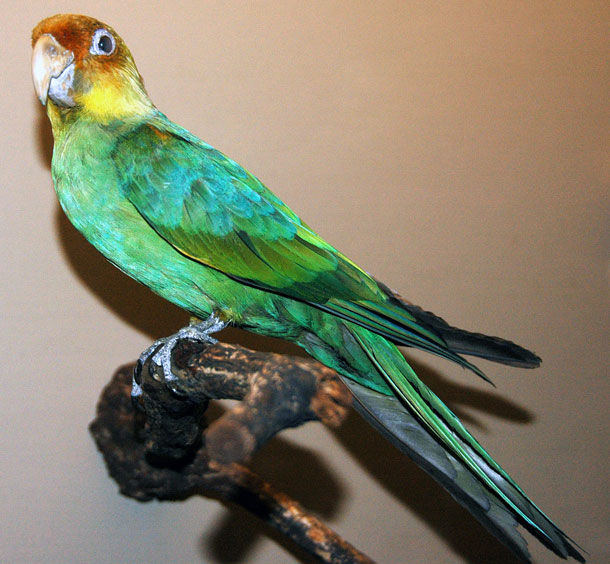Beyond The Headlines
Air Date: Week of February 16, 2018

The Carolina Parakeet was driven to extinction in 1918 in part because its feathers were in demand for ladies’ hats at the time. (Photo: Wikimedia Commons)
Peter Dykstra and host Steve Curwood discuss grim news about the number of environmental activists killed in recent months, and why Toyota’s once wildly popular Prius has seen a steep sales slump. Then they remember the lovely Carolina parakeet, driven to extinction a century ago by farmers, loss of habitat and the demand for feathers on womens’ hats.
Transcript
CURWOOD: Let’s take a look beyond the headlines now with Peter Dykstra of Environmental Health News, that’s ehn.org and DailyClimate dot org. He’s on the line from Atlanta Georgia. How are you doing, Peter?
DYKSTRA: I’m doing alright, Steve, how about you?
CURWOOD: Things are pretty good, it’s kinda cold though still. So, what do you have for us? What’s going on?
DYKSTRA: Well, let’s start with some down news but we have to report it. The non-government group, Global Witness, said that in 2017, 197 environmental activists around the world were murdered.
CURWOOD: Oh my. So where, why, who?
DYKSTRA: Bear in mind that’s four a week. These are peasants, landowners, farmers, local activists trying to protect their homes. Working against dam projects, big logging operations, big mining operations. 197. Also just this past week there’s a man named Esmond Bradley Martin. He was a legend in hunting down smuggling paths for rhino horn and elephant tusks. He was stabbed to death in his bed in Nairobi.

Sales of the Toyota Prius have hit a slump in the last few years. (Photo: Wikimedia Commons)
CURWOOD: And, Peter, I thought I saw something in the news about an Iranian environmentalist who was killed.
DYKSTRA: Yes, a Canadian Iranian professor who was named Kavous Seyed Emami. He ran and founded the Persian Wildlife Heritage Foundation. He was brought in on espionage charges, it’s not really clear what the espionage could have possibly been and then he was found hanged in his solitary confinement cell. The family is not buying at all that he hanged himself.
CURWOOD: No, it doesn’t sound like that to me. Hey, what else is going on?
DYKSTRA: Well, let’s turn stateside and look at the Prius. You know, the Prius was a phenomenon a few years ago. 2012 sold 236,000 cars. 2017 that number fell by more than half - 108,000 cars.
CURWOOD: So, Toyota is having a sales problem with the Prius? What’s going on?
DYKSTRA: Well, there are a lot of things going on. Number one, the whole hybrid notion has spread to larger cars like the Camry, the Rav 4, which is a crossover, is selling. So, that’s taking some of the lightning away from Prius but also you have cheap gas. It stayed cheap and if gas is cheap people have less motive to buy a fuel efficient car. Fuel efficiency standards have gone up in general -- although watch out for that to change in the Trump administration. Competition from other car makers. Not just hybrids but also EVs. And the Prius designs seem to be less enchanting to the public than they were a few years ago.
CURWOOD: Yeah, I got to say it’s not the most lovely car on the road right now. Hey, what do you have for us from the history vault?

Iranian-Canadian environmentalist Kavous Seyed Emami was found hanged in his jail cell in Iran. (Photo released by Emami’s family)
DYKSTRA: Something that happened 100 years ago, kind of a sad event. The Carolina Parakeet used to swarm over the eastern US. It was the only parakeet species that’s native to North America. It met its demise over the years. Number one, farmers hated the Carolina Parakeet because they ate apples, they ate other seeds they ate corn seed. Another reason is that the forests that they thrived in were being taken down for farmland, and cities, and factories. And finally, the third thing is that the Carolina Parakeet, like most parakeets, had beautiful colorful plumage and that plumage was prized for lady’s hats a century ago. And the Carolina Parakeet died out – the last one died in the Cincinnati Zoo in the year 1918.
CURWOOD: And they’re completely extinct. Why didn’t someone breed them or something?
DYKSTRA: Well, they were pretty easy to capture and the conventional wisdom is they would have been pretty easy to captive breed but that kind of thing just didn’t happen in 1918.
CURWOOD: Well, thanks Peter. Peter Dykstra is with Environmental Health News. That’s EHN dot org and Daily Climate dot org. We’ll talk to you again real soon.
DYKSTRA: Ok, Steve, thanks a lot. We’ll talk to you soon.
CURWOOD: And there’s more on these stories at our website. LOE dot org.
Links
The Guardian: 197 environmental activists were killed worldwide in 2017
The Guardian:: “Top ivory investigator murdered in Kenya”
Green Car Reports: “Toyota Prius hybrid sales have tanked: here are 4 reasons why”
Living on Earth wants to hear from you!
Living on Earth
62 Calef Highway, Suite 212
Lee, NH 03861
Telephone: 617-287-4121
E-mail: comments@loe.org
Newsletter [Click here]
Donate to Living on Earth!
Living on Earth is an independent media program and relies entirely on contributions from listeners and institutions supporting public service. Please donate now to preserve an independent environmental voice.
NewsletterLiving on Earth offers a weekly delivery of the show's rundown to your mailbox. Sign up for our newsletter today!
 Sailors For The Sea: Be the change you want to sea.
Sailors For The Sea: Be the change you want to sea.
 The Grantham Foundation for the Protection of the Environment: Committed to protecting and improving the health of the global environment.
The Grantham Foundation for the Protection of the Environment: Committed to protecting and improving the health of the global environment.
 Contribute to Living on Earth and receive, as our gift to you, an archival print of one of Mark Seth Lender's extraordinary wildlife photographs. Follow the link to see Mark's current collection of photographs.
Contribute to Living on Earth and receive, as our gift to you, an archival print of one of Mark Seth Lender's extraordinary wildlife photographs. Follow the link to see Mark's current collection of photographs.
 Buy a signed copy of Mark Seth Lender's book Smeagull the Seagull & support Living on Earth
Buy a signed copy of Mark Seth Lender's book Smeagull the Seagull & support Living on Earth

